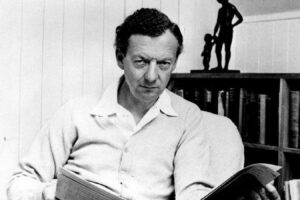

Floyd writes his own libretti, usually drawn from literature where his taste is choice. Besides the Apocrypha and Steinbeck, his operas have been inspired by novels of Emily Brontë, Esther Forbes and Robert Penn Warren. He is drawn to stories of social outsiders, rebels or outcasts, and his operas achieve their greatest success when great singing actors bring them to life. Norman Treigle and Phyllis Curtin introduced Susannah to the New York City Opera in 1955. Both began great careers with it, and Floyd composed more music for each of them, including Markheim of 1966, which is dedicated to Treigle. More recently, Anthony Dean Griffey has scored triumphs with several companies in Of Mice and Men.
The Little Opera double-bill is given in a small theater by young and able singers, the type whose voices flower in the space, and there were no subtitles to distract attention from the stage: Just about every sung word was clear. Both operas were composed for full orchestra, of which Floyd was already a master, but have been reduced on this occasion to some eighteen instruments, allowing full woodwind accompaniment and even a French horn, besides a harp and a xylophone. This should make them more easily usable by the small-scale opera companies popping up all over the country these days.
Slow Dusk, Floyd’s first opera, composed in 1948, is a student exercise in American Verismo, a tale of thwarted love in the backwoods (Floyd is from South Carolina) with very little plot to motivate full-bodied singing—you could sum it up in a folk song, and a brief one at that: They love, her family disapproves, he drowns (accidentally—familiar with the ways of both Verismo and Country, I expected a murderer to be revealed, but no). Nothing in the music—nothing—not a tune, not a note of her grief—suggests the girl’s sorrow will endure. She’ll love again. (Marie Dressler would say, “No, of course not … but just in case you do love again ….”)

Only Sarah Beckham-Turner, as beloved and lovelorn Sadie, got much chance to show off her voice, a pleasant-hued soprano. Her powerful middle voice thins a bit on top though without an audible break, and most of Floyd’s music, even when emotions are strong, remains in the vocal comfort zone. Too many composers of his era could not do this, and raced for the stratosphere to represent overpowering passion. Floyd’s instincts were always better than that.
It was a good thing the four singers of Slow Dusk had strong voices, as they all turned up again, as Christmas Eve carolers in the street outside the pawnshop in Markheim, a supernatural fable from a Robert Louis Stevenson ghost story. Stevenson, being a Scot, knew the supernatural well, and he knew the psychological doppelganger tradition of Hoffmann and Poe, and gave it new life in Dr. Jekyll and Mr. Hyde. Markheim is not an achievement on that level. Most of the story’s charm lies in its fervid depiction of the guilt-ridden fantasies of a murderer. Those pounding clocks! (Well delineated in Floyd’s orchestration.)
Floyd has altered the story considerably, fleshing out the victim, a stingy pawnbroker named Creach, who sings rather too much in order to provide embarrassing exposition for the protagonist, Markheim, driving him to murder—and the encounter with his diabolical conscience that is the heart of the opera. The handsome if basic 1880s pawnshop set is by Neil Patel; the clear direction by Philip Shneidman. Lara De Bruijn did the costumes; clearly she is happier in plush London (those waistcoats! those bustles!) than out in the threadbare fields with a plot that hinges on soggy overalls.
The cast of Markheim, once again, consisted (carolers besides) of four strong young singers, veterans around the country and in Europe. Jeremy Milner is tall, gaunt and goodlooking, with a dark and rolling bass, but his demeanor is stiff and he was dogged with terrible stage luck: The valuable statue he had come to pawn fell and shattered, his coat slid off chairs and counters, doors he slammed swung open abruptly. It was not the way a tormented soul usually elicits audience sympathy, but his melodious and emotional stanzas of narration and self-torment also drew applause. (One can but dream what Treigle was like in this role.)

Role, music and stage presence mingled best upon the entrance of Marc Schreiner as Markheim’s diabolical unexpected guest. Besides having a tenor of eloquence and easy power, Schreiner is very much at home on the stage, urbanely mephistophelean, focused always on his prey and not on the audience. He knew he had us glued to his every syllable. (He sings Britten’s Peter Quint; I bet he does! Scary!) Schreiner caressed the music and seemed to lick his lips around its every insinuating nuance. I suppose ones hopes the desperate Markheim, a man with no other good qualities, will defy him, defending his, well, humanity, but if the Stranger didn’t already own the wretch, he certainly had us by the short-hairs.
Floyd has broken the story into a series of ariosos, blocks of text that do not quite synchronize naturally. The musical statements are too long and involved for naturalistic dialogue, insufficiently memorable to constitute separable arias. All four roles are well characterized and give the singers something to bite into. Neither part nor music fades drably into the Victorian wainscot, and the creepy atmosphere is more original than cinematic cliché. The orchestration is subtle and distinctive, egging the personalities on; Richard Cordova led a taut, supportive performance.
Markheim stands or falls as a theater-piece, flowing and direct. At LOTNY it holds attention and gives worthy artists chances to show what they can do. Carlisle Floyd’s popularity with those who perform him is entirely explicable.
Photos: Tina Buckman


























Comments